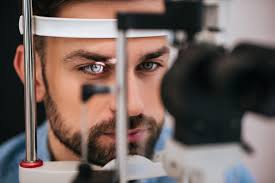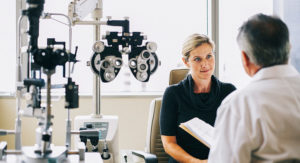
As individuals with diabetes know, diabetes affects nearly every aspect of a person’s health. This includes the eyes and visual health. Diabetics are at an increased risk for several disorders, including diabetic retinopathy. For diabetics, annual eye exams are essential for maintaining clear and healthy vision. Continue reading below for more information on how diabetes can affect vision.
How does diabetes affect the eyes?
Diabetes affects the eyes much like it affects the rest of the body. In particular, diabetes tends to damage blood vessels in the eyes, which can damage the retina and cause permanent loss of vision. Increased blood sugar levels also affect vision, causing mild conditions in which vision is temporarily blurry (such as after a high-carb meal) as well as more serious conditions like cataracts. Individuals with diabetes are more likely to have glaucoma as well.

How do I know if diabetes is affecting my eyes?
Symptoms vary depending on the problem as well as the patient. In general, it is important to note that many eye diseases related to diabetes may not show symptoms in the early stages, which is why regular dilated eye exams are important for diabetics. Still, some common signs of eye problems stemming from diabetes are blurred vision, floaters, blank or dark spots in vision and glare. If you are experiencing symptoms, schedule an eye exam as soon as possible, as vision loss can be permanent in some cases.
What can I do to prevent vision loss from diabetes?
Most importantly, individuals with type 1 and type 2 diabetes should follow their primary care physician’s recommendations for diet and exercise. While all diabetics should closely monitor and manage blood sugar levels, keeping blood pressure at a healthy level may also help reduce the risk of diabetic eye disease.
Because diabetic retinopathy and other serious conditions may not present symptoms in the early stages, it is important that diabetics regularly see an optometrist for a dilated eye exam. An annual check up is generally recommended, but you should work with your eye doctor to determine the best plan for your vision.

Visit Louisiana Eye & Laser for help with diabetic eye care
All diabetics should regularly receive a dilated eye exam to check for diabetic retinopathy and other diseases, regardless of whether or not they have symptoms. By catching problems in the early stages, our staff can work with you to manage and resolve disorders before they become serious. Whether it has been a year since your last exam or if you believe you are experiencing symptoms related to your diabetes, our highly-trained staff is here to help! Simply call, go online or stop by one of our offices to schedule an eye exam at Louisiana Eye & Laser!




